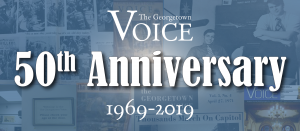We live in a time when the media is constantly under attack, whether by right-wing politicians, internet trolls, or the public as a whole when misinformation makes its way into the mainstream. Meanwhile, mass layoffs at newspapers have put journalists in a constant state of uncertainty.
The press is not the enemy of the people, despite what the current president thinks. But these attacks on the media are not new. The Voice was founded in 1969 to cover the Vietnam War while President Richard Nixon, whose hostilities toward the media have been well-noted in history, was in office. Nixon’s constant attacks on the “liberal media” were an effort to deflect and cloud the criticisms cast on him, a precursor to the aspersions cast toward the media today.
While anti-media sentiment has traditionally critiqued the press as biased, slanted, or sensationalist, the current attacks from the highest offices are much more vicious. The president has labeled journalists “the enemy of the people” and “very dangerous and sick.” These attacks have not been limited to national outlets. On college campuses, including ours, students have responded with an increased passion for journalism at all levels.
Student media organizations play an important role in holding institutions accountable for their actions and keeping students informed of events that affect them on- and off-campus. In the face of threats to our ability to do this, it’s more essential than ever that we have the support of our campus communities.
Many school newspapers have faced censorship from their own administrations. In response to a story about a teacher fired for inappropriate conduct, a Nevada high school student paper was shut down by the school’s administration.
These types of problems exist at the level of higher education as well, where students are supposed to freely explore and challenge their worlds. Recently, the Baylor University administration asked its tour guides to get rid of copies of the campus newspaper that featured a story about sexual assault in an attempt to protect the university’s image. Stories that call out the administration or expose scandals may reflect badly on a university, but students still have a right to be informed of the issues that affect them. Universities must not deny students this right by censoring stories they don’t want made public.
We are lucky to attend a school that supports its campus media, at least to a certain extent. Georgetown currently has a robust campus media presence, and students have access to a variety of journalistic opportunities in the D.C. area, especially internships. But there has always been tension between the reporting done by student journalists and the administrations that house and fund them. Because Georgetown is a private institution, the Voice and The Hoya and other news outlets have few avenues to obtain information about the university outside of what its spokespeople decide to share. This tension shows no signs of abating, but we are calling for the university to share, rather than hide the information we seek, to encourage a more transparent and collaborative relationship between Georgetown and its news publications, and thus its students.
Furthermore, Georgetown needs to commit to fully funding and supporting its journalism program. The minor should not be limited to only 20 students seven years after its founding, but instead it must be given the resources to support all who demonstrate interest and passion. As students, we attend this university to pursue our diverse interests, and by limiting our available pathways, Georgetown inherently limits its students’ opportunities. Furthermore, journalism isn’t limited to hard news but includes opinions, cultural commentary, and multimedia work, and the university’s journalism program must reflect that reality by providing learning opportunities for all facets of media, especially as the profession rapidly changes in the coming years.
Media Board, the committee that represents student media organizations to GUSA and the administration, should receive full funding on a consistent basis so that we can effectively plan for our future. At the risk of limiting the capacity to which we can keep the campus informed, we can’t just continue to cut print costs without the funding for computers, for design software, for multimedia journalism, for event coverage, and for both printing fees and website platform subscriptions.
The press at all levels needs support more than ever. Those on the side of right-wing extremism, often vocal supporters of the president, have surpassed simple criticism of coverage and actually called for violence against journalists. This can hardly be considered lightly after five newspaper staffers were murdered in Maryland last July by a man angered by their coverage of him.
Write letters to the editor, buy subscriptions to newspapers, pick up an issue of a campus magazine. On our part, we promise to give a voice to the readers who are actively listening and hoping to change people’s minds by publishing your opinions and listening to your criticism so we can improve. For the past 50 years, the Voice has tried with journalists across the world every day to make the world a fairer place by sharing the stories that matter most. Now, more than ever, all we ask is that you read and listen.
The editorial was published as part of the Voice‘s 50th anniversary edition.



